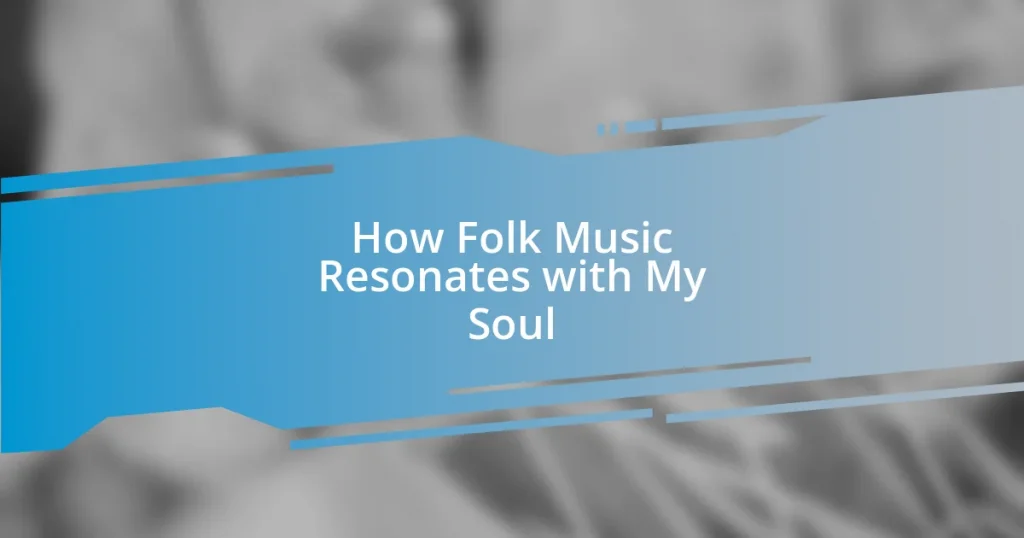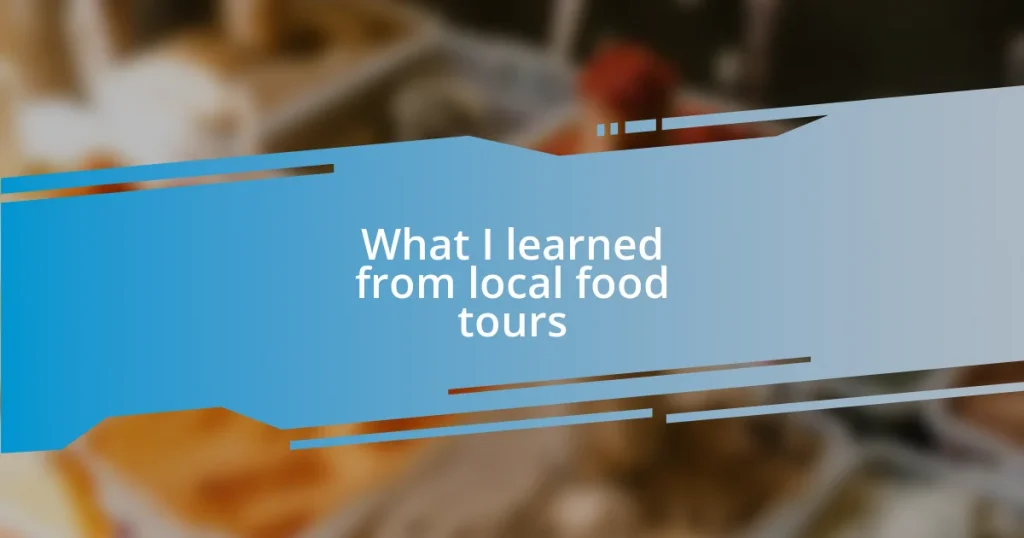Key takeaways:
- Folk music fosters personal connections, with each song evoking cherished memories and communal ties that link generations.
- The emotional impact of folk lyrics provides a narrative that resonates with listeners, reflecting universal themes of struggle and resilience.
- Creating a unique folk sound involves personal storytelling and experimentation with instruments, allowing individuals to express their identities and experiences through music.
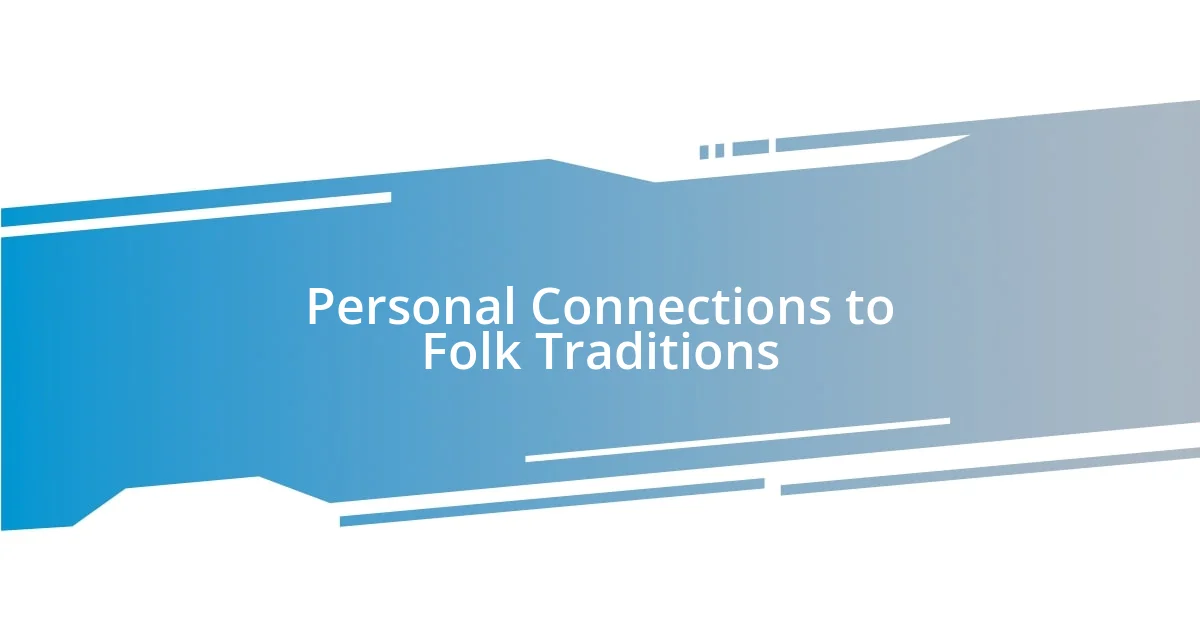
Personal Connections to Folk Traditions
Growing up in a family that cherished the stories sung through folk songs, I felt an immediate connection to the rhythm of life they conveyed. I remember my grandmother humming old ballads while kneading dough, her voice weaving the fabric of our past into the present. Isn’t it fascinating how a simple melody can transport us back to moments we thought were lost?
One summer evening, I attended a local folk festival, where the energy was infectious and the sense of community palpable. It struck me how the musicians effortlessly bridged generations, their tunes telling tales that resonated with both the young and old. How often do we find ourselves longing for those connections that music, in its simplest form, can forge?
Reflecting on my own experiences with folk traditions, I find that each song carries an emotional weight, often reminding me of loved ones or cherished memories. One particular song reminds me of family gatherings, where laughter and harmonies flowed freely. It makes me wonder—what role do these folk traditions play in shaping our identities and connecting us to our roots?
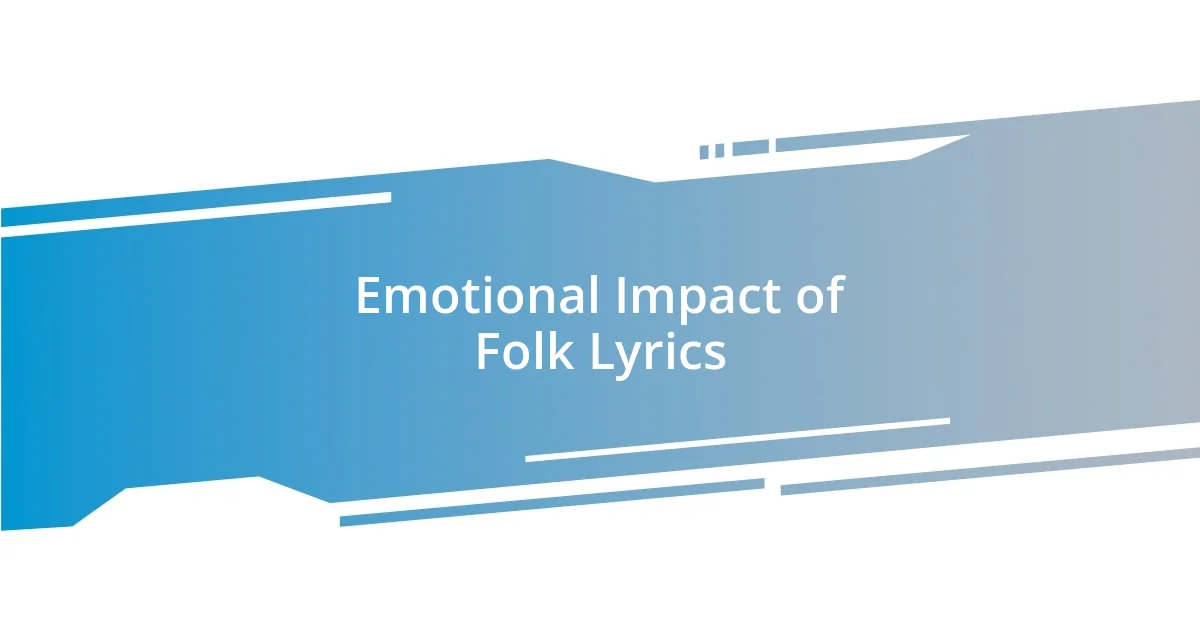
Emotional Impact of Folk Lyrics
When I listen to folk lyrics, I often feel like I’m peeking into the window of someone else’s heart. I recall a song that tells of heartbreak and longing. It resonates deeply with me, reminding me of a time I went through a tough breakup. The singer’s raw sincerity painted vivid images in my mind, evoking emotions I thought I had buried. Have you ever felt that kind of connection with a song? It truly feels like the artist understands your pain.
Folk songs often weave narratives that reflect life’s struggles, celebrations, and everything in between. I remember singing along to a tune that described the daily toil of farm life. It made me appreciate the hard work of my grandparents, who toiled to build a better future. There’s something empowering about lyrics that honor the sacrifices of our ancestors. They serve as a bridge between the past and the present, reminding us of our shared human experience.
What fascinates me most is the storytelling aspect of folk lyrics. Each verse invites listeners to become part of a larger narrative, almost as if we are co-writers of our own history. I distinctly recall a song that shared tales of resilience during tough times. As I listened, I felt a renewed sense of hope wash over me, resonating with my own struggles. Isn’t it remarkable how these stories can uplift our spirits?
| Aspect | Emotional Impact |
|---|---|
| Personal Connection | Lyrics often evoke personal memories and experiences. |
| Universal Themes | Folk lyrics reflect common human struggles, fostering empathy. |
| Storytelling | Each song tells a unique story, inviting listeners into a shared experience. |
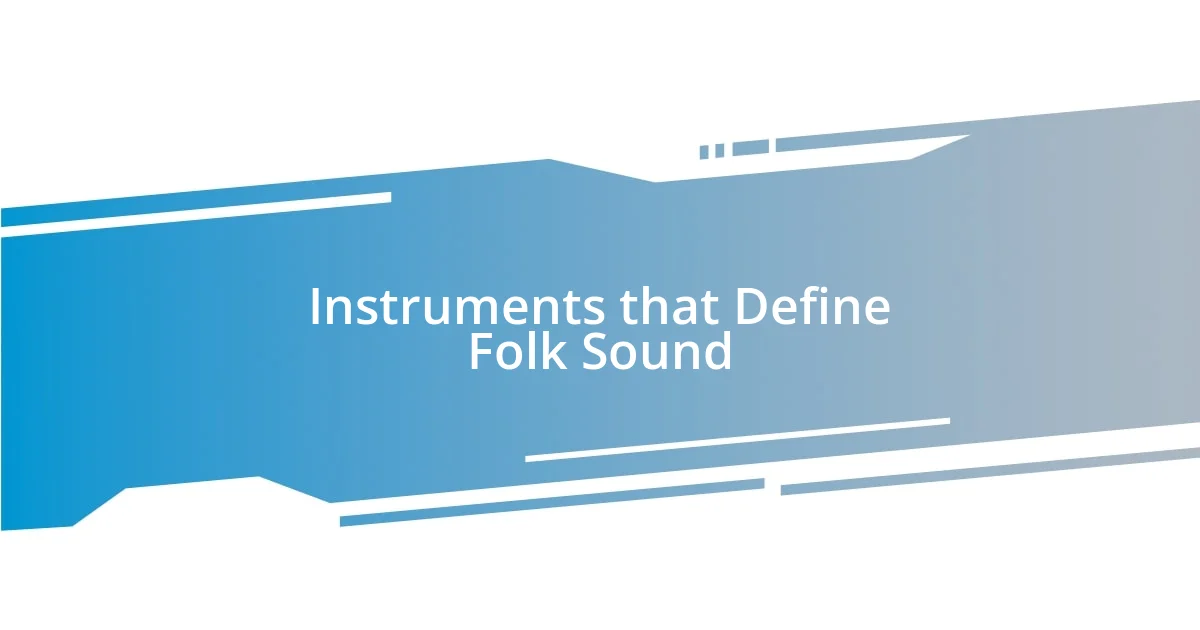
Instruments that Define Folk Sound
Folk music’s soul is undeniably shaped by its unique instruments, each contributing to the warmth and authenticity of its sound. I vividly remember my first encounter with the sound of a banjo at a cozy café, where its bright and twangy tones danced around the room. It felt like an invitation to join in the storytelling, enhancing the lyrics with a playful spirit. Instruments like this have a way of connecting us to the roots of folk culture.
Here’s a look at some key instruments that define the folk sound:
– Banjo: Known for its cheerful brightness, the banjo often fills the air with a lively rhythm that invites toe-tapping.
– Guitar: A versatile staple, the acoustic guitar forms the backbone of many folk songs, supporting melodies with its soothing chords.
– Fiddle: With its expressive range, the fiddle evokes deep emotions, from joyous dances to poignant ballads, often bringing the narrative to life.
– Mandolin: This small, stringed instrument adds a distinctive ring and sparkle to folk tunes, making them feel both intimate and vibrant.
– Accordion: Its rich, resonant sound can evoke nostalgia, often transporting listeners to yesteryears, enriching the storytelling aspect of folk music.
Whenever I hear a guitar strumming alongside a fiddle, I’m reminded of family camping trips where we gathered around the fire, singing songs that echoed into the night. Those moments, steeped in the sounds of folk instruments, illustrate how these musical tools not only create enjoyable music but also forge connections, making our experiences feel timeless and shared.
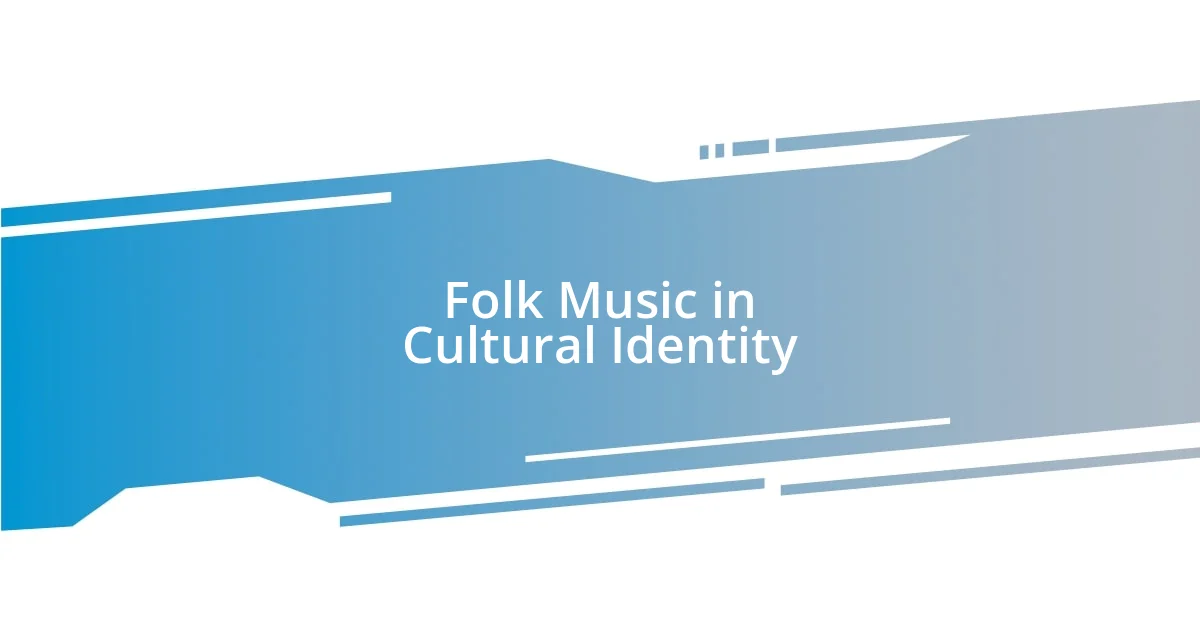
Folk Music in Cultural Identity
Folk music serves as an anchor for cultural identity, connecting generations through shared stories and experiences. I recall attending a folk festival where performers shared songs steeped in local history. The pride and joy on their faces reminded me just how deeply music can encapsulate our collective roots. Have you ever felt that rush of belonging when listening to a song that resonates with your own background? It’s a powerful affirmation of who we are.
What strikes me most about folk music is how it acts as a vessel for tradition. In my family, we have a particular song that gets sung every holiday season, telling tales of our ancestors. Each verse reminds us of our heritage, and the way we gather around to sing it feels like a ritual that strengthens our bond. Through these melodies, I find not just my identity but the identity of my community. Don’t you think there’s something magical about that?
Furthermore, folk music serves as a reminder of our shared struggles and triumphs. I remember my grandmother telling me stories of her youth, often accompanied by the tunes she cherished. These snippets of history felt alive, as if the music breathed life into her memories. It made me ponder: how often do we overlook the influence of music in shaping our understanding of who we are? Folk music invites us to reflect on our past, helping us navigate our present and future.
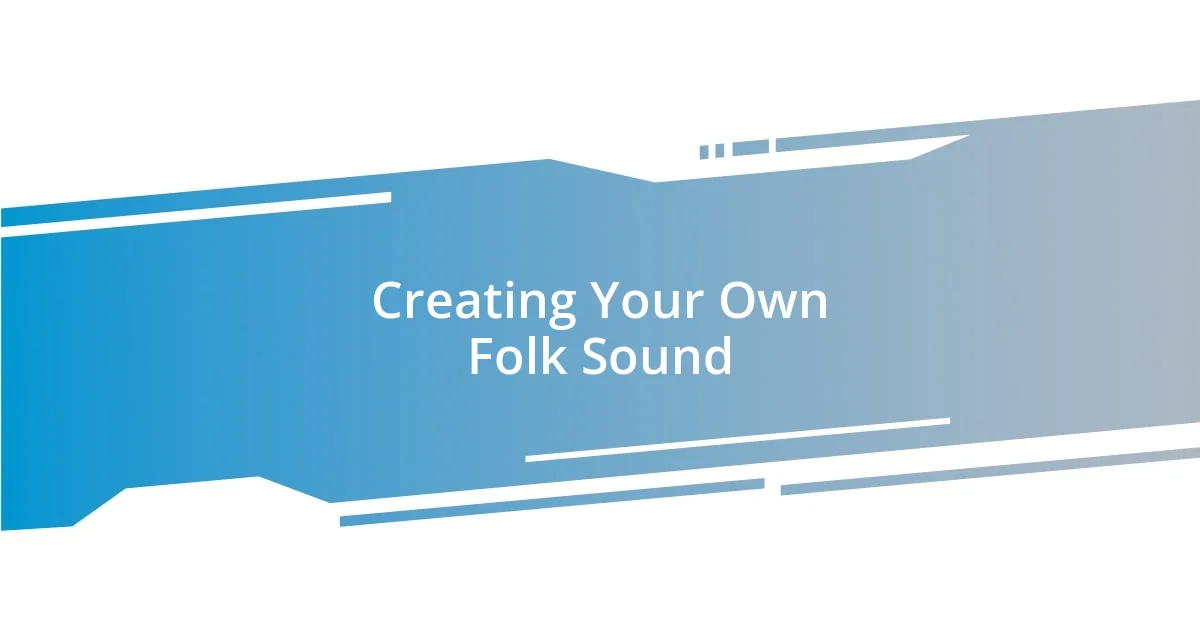
Creating Your Own Folk Sound
Creating a unique folk sound is all about embracing your personal experiences and emotions. When I sat down to write my first folk song, I drew inspiration from a trip to the mountains where the air was crisp, and the sun hung low in the sky. How can this be translated into music, you might wonder? I tried to capture that serene beauty with soft guitar strumming and gentle melodies that reflected the feeling of peace I found amongst the trees.
It’s fascinating how adding just a few personal elements can transform a song. For instance, I sometimes weave in family stories or local legends that resonate with my community. I once wrote a tune about the old oak tree in my backyard that my grandfather had planted. When I incorporated those details, the song became more than just notes; it told a story that felt intrinsically connected to my roots. How profound is it that our experiences can shape the sound of our music?
Moreover, experimenting with different instruments can help cultivate your signature folk style. I often play around with combining a ukulele’s joyful strums with a harmonica’s soulful blows. Each time I mix them, I find something new and exciting that enhances the storytelling element of my songs. Isn’t it amazing how the right combination of sounds can evoke certain emotions or memories? This trial and error is part of what makes creating your own folk sound so rewarding and personal.











